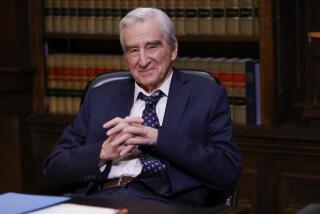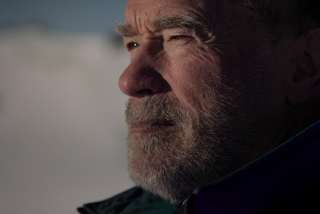Palimony Trial Jurors Hear the Wisdom of a Yogi
- Share via
In media coverage of Jack Klugman’s so-called palimony trial, the 77-year-old actor is invariably identified as being best known for his television roles as a slovenly sportswriter in “The Odd Couple” and a quizzical coroner in “Quincy, M.E.”
Seldom mentioned is the film role that first familiarized Klugman to much of his public, his appearance in 1957’s classic courtroom drama, “12 Angry Men”--as a juror.
If ever there was an example of how demanding it can be to sit on a jury, that movie was it.
Tuesday afternoon in Los Angeles Superior Court, the defense attorney, James Patrick Clark, began his closing argument on Klugman’s behalf by profusely thanking the jurors--seven women and five men, none visibly angry--for their efforts and for their “careful consideration of our case.”
Then, right after that, Clark did something that few lawyers probably have done inside a courtroom, even on TV.
He said that while preparing for his summation in this case, he went to a shopping mall. Clark said that was where he found a book as useful as a lawbook, words of wisdom from “one of the great American philosophers.”
“His name was Yogi Berra.”
*
You come to expect any number of sage figures to be quoted in a court of law, from Oliver Wendell Holmes to Plato. Very rarely do you hear anyone cite the former catcher of the New York Yankees.
Clark clarified for the jurors that Yogi Berra was as well known for his colorful sayings as he was for being a baseball hero of the 1940s, ‘50s and ‘60s.
For instance, it was Berra who said that nobody ever goes to a certain restaurant anymore “because it’s too crowded,” the lawyer explained.
“He also once said that ‘Steve McQueen looked pretty good in that picture . . . he must have made it before he died.’ ”
The jury in Judge Kurt J. Lewin’s courtroom listened intently, no doubt wanting to know what any of this had to do with Jack Klugman paying palimony.
Eventually they were told that it was also Yogi Berra who once said of something--a team’s chances in a baseball series, probably--”It’s not over ‘til it’s over.”
This seemed to be the attorney’s way of reminding jurors that no matter what conclusions they might have drawn from a week and a half of testimony, the trial was not over until they weighed all of the evidence.
For close to two hours, the defense explained why, in its opinion, Klugman should not be obligated to financially support a woman with whom he was once involved, Barbara Neugass, 57.
Neugass has accused the actor of reneging on a promise to support her forever. Klugman claims he guaranteed no such thing.
The case isn’t over until it’s over . . . but it drew nearer a conclusion Tuesday after the defense wrapped up its case.
A palimony case typically gets ugly. This one did. Klugman at one point was accused by attorney William Glucksman of having “an insatiable ego combined with monumental insecurity.”
The actor’s attorney said even though the couple broke up in 1992, Klugman paid Neugass’ medical bills, gave her $17,000 worth of stock, bought her a house in Palm Springs and paid for her mother’s funeral.
“That isn’t a contract. All that proves is that he was generous,” Clark said. “It’s like I said in my opening statement, no good deed goes unpunished.”
He told the jury that Neugass never inquired about her situation when Klugman underwent life-threatening surgery for throat cancer, “never even sent a get-well card.” He also insinuated that she wrote insults about the actor’s current companion on the walls of Klugman’s ranch, adding that photographs were stuck with pins in the eyes and throat.
In conclusion, Clark said of Neugass, “She simply isn’t able to tell the truth.”
*
Ever since the landmark case involving actor Lee Marvin, palimony has proven to be a tricky subject for juries, inasmuch as assurances without documentation must often be taken at face value.
“Yogi said, ‘You can observe a lot by watching,’ ” Jack Klugman’s lawyer told the jury Tuesday.
Face value itself, for instance.
Clark cited something he called “demeanor evidence” in his closing, describing Neugass as someone who was not convincing on the witness stand, whereas his own client “looked like a man telling the truth.”
Looked like a man telling the truth. Yogi ought to love that line.
*
Mike Downey’s column appears Sundays, Wednesdays and Fridays. Write to him at Times Mirror Square, Los Angeles 90053. E-mail: mike.downey@latimes.com
More to Read
Sign up for Essential California
The most important California stories and recommendations in your inbox every morning.
You may occasionally receive promotional content from the Los Angeles Times.










